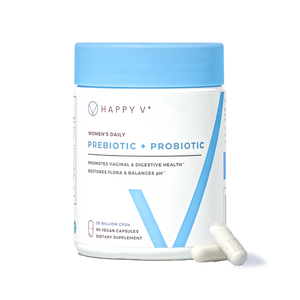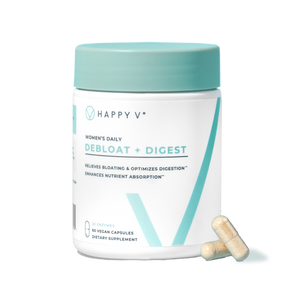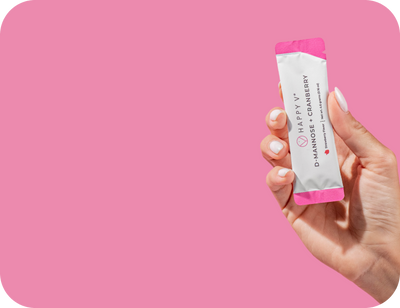- Fact Checked
- June 09, 2025
- 13 min read
The Best Time to Take Probiotics? It's Not What You Think
Table of Contents
Table of Contents

No one wants to waste their money, right? If you’re taking probiotics (and especially if you’re taking them to ease digestive discomfort or avoid vaginal infections), you want to make sure they actually work and deliver all those great benefits they promise on the website. That’s why one of the most common questions women new to probiotics ask is: When’s the best time to take probiotics? And truthfully? The answer might surprise you.
While the research shows that timing might play a small role, what really determines a probiotic’s efficacy comes down to consistency, quality, and finding what works best for your body.
This post is for informational purposes only and does not constitute medical advice. See full disclaimer below.
Why Timing Isn't as Critical as You Think
Should you take probiotics in the morning or evening? With meals or on an empty stomach? The truth is, while you’ll find plenty of advice about this online, the scientific evidence doesn't point to a single winner.
So far, what research has found is that different types of probiotics behave differently, and individual factors like your meal composition, stomach acid levels, and personal digestive patterns all play a role in how timing positively or negatively affects efficacy.
Some studies suggest that certain probiotic strains, like Lactobacillus and Bifidobacterium, may survive better when taken with meals as opposed to on an empty stomach1, as food can buffer stomach acid and help these live microorganisms make it safely through your gastrointestinal tract to your intestines. However, if you buy certain probiotics that are enteric-coated, like Happy V’s (meaning they’re designed to protect probiotics from gastric acids, regardless of time of day), then this doesn’t matter quite as much.
So if timing doesn’t matter for probiotics, what does? When it comes to this, the science is actually quite clear.
What Actually Matters: Consistency
Trying to time your probiotics right is kind of stressful. And science says it isn’t really necessary. What does make a difference is taking your probiotics at the same time every day.
This consistency is crucial for two reasons:
1. You build a daily habit
Whether you pair your probiotics with your morning coffee, lunch, or evening routine, creating a ritual around supplementation means you won't forget. And let’s face it, no matter how good your probiotics are, they won’t work if you don’t take them.
Continual daily support is what allows beneficial bacteria to establish themselves and maintain balance in your body, including your vaginal microbiome and digestive system.
2. Your body thrives on routine
Regular use of probiotic supplements helps maintain a stable population of good bacteria throughout your microbiome2. When you miss doses, it disrupts this balance and makes it harder for these dietary supplements to deliver their full health benefits for vaginal health, digestive wellness, and immune system support.
As for what those benefits are, we’ll get into those later. For now, here are some practical tips for staying consistent:
- Choose a time that naturally fits into your existing routine, whether that's with breakfast, dinner, or another consistent meal. If you already take a daily supplement or medication, take your probiotic at the same time—just add it to the list!
- Set a reminder on your phone until the habit becomes automatic
- Keep probiotic products visible on your counter, your desk, your nightstand, or wherever you'll see them daily

Quality Trumps Everything
While consistency is one part of the battle, even the most consistent use of low-quality probiotics won’t give you the health benefits you’re looking for. This is where you need to be a savvy consumer when choosing probiotic supplements.
Here are 4 things to consider when choosing a probiotic to ensure it’s high-quality:
Look for targeted support
Choose a probiotic designed for your specific needs. If you’re dealing with vaginal issues like recurrent infections or pH imbalance, opt for a women’s probiotic formulated with clinically studied strains that support vaginal health, like Lactobacillus rhamnosus and Lactobacillus reuteri3. For digestive discomfort, look for strains that promote gut balance and regularity.
Check the strains and potency
Not all probiotics are created equal4. When it comes to women’s health specifically, Lactobacillus acidophilus LA-14® and Lactobacillus rhamnosus HN001™ are among the most researched probiotic strains and, when combined, have been shown to help reduce vaginal infection risk and support gut balance5.
It’s important that your supplement label clearly lists every strain that they use, not just the genus (so you should see Lactobacillus acidophilus LA-14®, not just Lactobacillus acidophilus). Different strains within the same genus can behave differently in the body, so some can provide health benefits while others have no effect at all. If a supplement does not list the strain or simply says “proprietary blend,” steer clear.
Lastly, make sure the label lists the CFUs (or colony-forming units; typically several billion per serving) for every strain. This will help ensure you are getting enough of each strain to make a difference6.
Consider the delivery method
Hard capsules, especially enteric-coated ones, offer better protection for probiotics as they travel through stomach acid and your upper gastrointestinal tract than other popular forms, like gummies.
If you struggle with oral capsules for whatever reason, certain dairy products, like yogurt and kefir, can be enhanced with probiotics7, and the fat-rich nature of these foods often helps probiotics survive the digestive tract.
Storage matters
Always store probiotics according to the instructions on the package. Some need refrigeration, while others are shelf-stable at room temperature. Check expiration dates and replace supplements that are past their prime.
How Your Diet Affects Probiotic Effectiveness
While not as important as consistency or probiotic quality, one last area to consider when you’re looking to get the most of your probiotic supplement is your diet. What you eat influences stomach acid levels and nutrient absorption, which affects how many beneficial bacteria survive their trip through your digestive system.
Taking probiotics with a meal that contains healthy fats, like avocado, nuts, or yogurt, may help protect the bacteria as they pass through the stomach. On the other hand, a low-fiber diet can leave your good bacteria underfed, while a diet rich in prebiotics (found in foods like bananas, oats, and garlic) helps those probiotics thrive once they reach your gut.
The bottom line: Pair your probiotics with balanced meals that include fiber and healthy fats for maximum benefit, and pay attention to how your body responds. Your personal digestion and routine are the best guide to what works for you.
Understanding the benefits of probiotics helps put the timing question in perspective. These beneficial bacteria go far beyond digestion—they play a crucial role in maintaining balance across your vaginal, urinary, digestive, and immune systems. The right combination of probiotic strains can help support each of these areas, providing targeted benefits backed by science.

Why Probiotics Matter for Women's Health
While probiotics are often associated with gut health8, the truth is, certain strains of probiotics have been shown to have a far wider impact than that, positively impacting vaginal health (we’re looking at you, BV and yeast infections!), urinary tract health, and more.
Vaginal Health
Your vaginal microbiome is a delicate ecosystem that relies on Lactobacillus species to maintain the right pH and protect against harmful bacteria and yeast9. When this balance is disrupted, it can lead to issues like bacterial vaginosis and yeast infections. If this imbalance does not get corrected, these issues can become recurring.
Certain probiotic strains, including Lactobacillus acidophilus (LA-14®), Lactobacillus rhamnosus (HN001™)10, Lactobacillus crispatus (CCFM1110™), Lactobacillus gasseri (HLG13™), and Lactobacillus reuteri (HR7™), are especially beneficial for vaginal health. In clinical studies, these species help restore a healthy microbiome, lower vaginal pH, and discourage overgrowth of unwanted microbes. And consistent use of these strains (because consistency matters!) has been linked to fewer recurrences of infections, improved vaginal comfort, and overall pH stability.
Urinary Tract Health
It’s probably not a huge shock, given their proximity to each other, that the urinary and vaginal tracts are closely connected. This means a healthy vaginal microbiome also supports urinary health.
Lactobacillus rhamnosus (HN001™) and Lactobacillus crispatus (CCFM1110™) are known to help reduce the adhesion of harmful bacteria like E. coli to urinary tract walls, which can lower the risk of urinary tract infections (UTIs).
By promoting a protective bacterial balance, these probiotics can reduce UTI frequency and help maintain urinary comfort, particularly in women who experience recurring infections or are recovering after antibiotic use.
Digestive and Gut Health
A healthy gut is a powerful ally. That’s because a well-balanced gut microbiome supports digestion, metabolism, and even mood regulation.
Probiotic strains like Bifidobacterium lactis (HN019™), Lactobacillus acidophilus (LA-14®), and Bacillus subtilis (DE111®) have been shown to improve digestive function by enhancing nutrient absorption, reducing bloating, and promoting regular bowel movements11.
Bifidobacterium lactis (HN019™) is especially known for its ability to support intestinal transit and comfort, while Bacillus subtilis (DE111®) helps maintain microbial balance by producing enzymes and encouraging the growth of beneficial bacteria. Together, they contribute to a healthier gut and more efficient digestion.
Immune System Support
Because most of your immune system resides in your gut, supporting a healthy microbiome also strengthens immune defenses. Strains like Lactobacillus reuteri (HR7™) and Bifidobacterium lactis (HN019™) help regulate immune responses and reduce inflammation, which supports the body’s natural ability to fight off infections.
An innovative prebiotic blend, PreforPro® (which includes bacteriophages LH01, T4D, LL12 (Myoviridae), and LL5 (Siphoviridae)) can further enhance probiotic effectiveness by selectively targeting harmful bacteria while allowing beneficial strains to flourish. This creates a more balanced environment that supports both immune and digestive health.
Happy V: Probiotics Designed Specifically for Women
When it comes to supporting vaginal, urinary, and digestive health, not all probiotics can deliver the results you’re looking for. Happy V is different. Our probiotic formula was developed with women’s unique needs in mind, focusing on clinically studied strains at clinically effective doses to deliver real, measurable results (and thousands of 5-star reviews!).
Preclinical studies of our formula also show that our unique combination of strains exhibits activity against Gardnerella vaginalis and Candida albicans, two of the most common microbes linked to bacterial vaginosis and yeast infections, meaning with consistent use, Happy V helps reduce the risk of imbalance and supports long-term vaginal wellness.
Basically, every quality standard you should look for in a probiotic supplement, Happy V meets it—and then some. We also manufacture everything in-house, so we can ensure the quality of every batch, and all of our products include clear, transparent labels.
With clinically proven strains, effective doses, and rigorous quality standards, Happy V makes it simple to give your body the daily support it deserves—no matter what time of day you take it.
Important Considerations and When to Talk to an Expert
While probiotics are generally safe for most people, it’s always a good idea to consult with a doctor or other healthcare provider before starting any kind of supplement (even one that’s high quality). This is especially true if:
- You have a weakened immune system, such as from HIV, cancer chemotherapy, or other conditions
- You're taking medications that could potentially interact with probiotics
- You have serious health conditions like inflammatory bowel diseases (IBD), ulcerative colitis, or C. difficile diarrhea
- You have allergies
- You're experiencing persistent vaginal symptoms
Frequently Asked Questions
Should I take probiotics in the morning?
Taking probiotics with breakfast can be a great option if that's when you'll most easily remember them, though you may want to avoid taking them first thing in the morning on a completely empty stomach. Stomach acid levels are often higher when you haven't eaten, which can reduce the number of beneficial bacteria that survive to reach your intestines and ultimately support your vaginal health. Having your probiotic with your morning meal, rather than before it, can help buffer stomach acid and improve the survival rate of the bacteria through your upper gastrointestinal tract.
Can I take probiotics with antibiotics?
Yes, and in fact, this is one of the most critical times to take probiotics for vaginal health. Antibiotics can disrupt beneficial bacteria throughout your body, including the Lactobacillus strains that protect your vaginal microbiome and support gut health. This is why many women develop yeast infections right after completing antibiotic treatment (SO frustrating). Taking probiotic supplements during and shortly following your antibiotic regimen can help maintain balance and reduce the risk of secondary infections.
However, timing actually does matter here. Take your probiotic at least two hours apart from your antibiotic dose to prevent the antibiotic from killing the beneficial bacteria in your supplement.
How long does it take for probiotics to work for vaginal health?
This varies depending on your individual vaginal microbiome and your health goals. Some women notice improvements within a few days, while for others it may take several weeks or months of consistent use to see the benefits of probiotics. Remember, the key is consistency. Beneficial microbes need time to colonize and create lasting changes to your vaginal flora balance. If you aren’t seeing any improvements in 3-4 months of consistent use, you may not be using the right probiotic for you.
Do I need to take probiotics forever?
Not necessarily! Some women take probiotic supplements continuously for ongoing vaginal health support and infection prevention, while others use them for specific situations, like during and after an antibiotic course or when experiencing symptoms. If you're prone to recurring vaginal infections, you may benefit from long-term supplementation to maintain a healthy vaginal microbiome. Or, once your vaginal flora is balanced and you're symptom-free, you might be able to reduce frequency or take probiotics as needed. Work with a healthcare provider or registered dietitian to determine what makes sense for your individual needs and health history.
Are probiotic supplements better than eating yogurt for vaginal health?
Both have their place, but probiotic supplements formulated specifically for vaginal health offer distinct advantages. While foods like yogurt and kefir provide beneficial bacteria for your gut, they don't necessarily contain the specific Lactobacillus strains that colonize the vaginal tract. Probiotic products designed for women's health—like Happy V—guarantee you're getting a consistent dose of CFUs targeted to where you need them most.
Will probiotics help with yeast infections?
Yes, quality probiotic supplements can be very helpful for preventing and managing yeast infections. Lactobacillus strains help maintain the acidic pH of your vaginal environment, which naturally inhibits the overgrowth of Candida (the yeast that causes infections). Many women find that taking probiotics regularly reduces the frequency of recurring yeast infections, especially after antibiotic use. However, if you currently have a yeast infection, you should see your healthcare provider for appropriate treatment while continuing probiotics to support your recovery and reduce future infections.
Final Thoughts
When it comes to probiotics, timing isn’t everything. Quality and consistency are what truly matter. Choosing a formula made with clinically studied strains, like those in Happy V’s probiotic blend, ensures you’re giving your body the support it actually needs to thrive.
By focusing on daily consistency, pairing your probiotics with balanced meals, and choosing products backed by science, you can help maintain a healthy vaginal microbiome, balanced digestion, and stronger immune defenses, setting the foundation for long-term comfort and overall wellness.
Keep the Conversation Going
-
Visit our blog for more women’s health tips.
-
Join our private Happy V Facebook group to hear from others who’ve been there.
- Explore supplements designed to support your vaginal health journey.
Disclaimer: This blog is for informational and educational purposes only and is not intended to diagnose, treat, cure, or prevent any disease. Statements about supplements have not been evaluated by the Food and Drug Administration.












